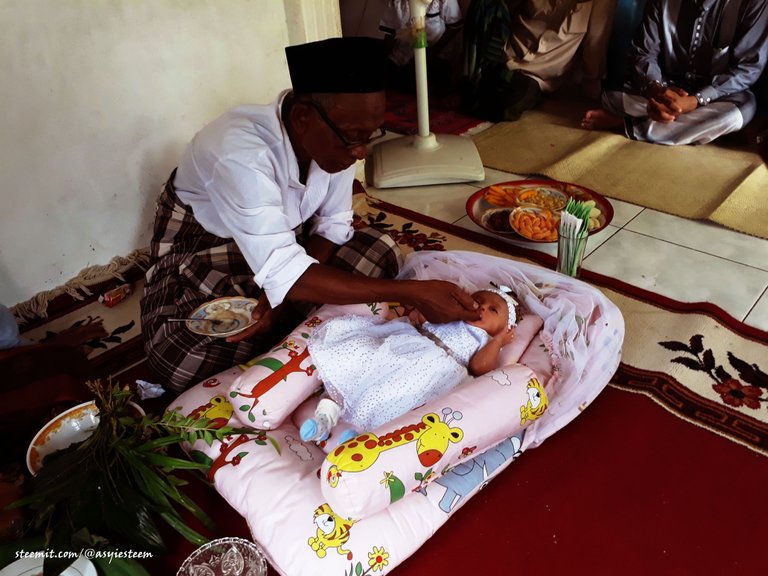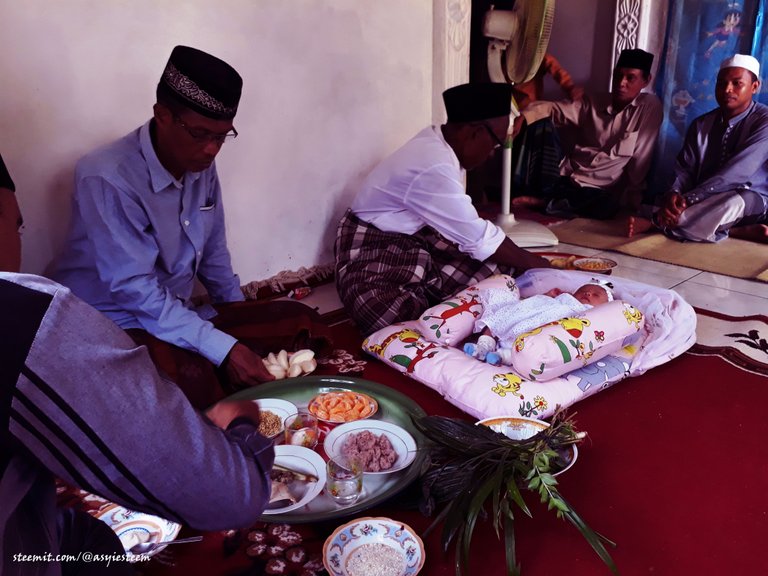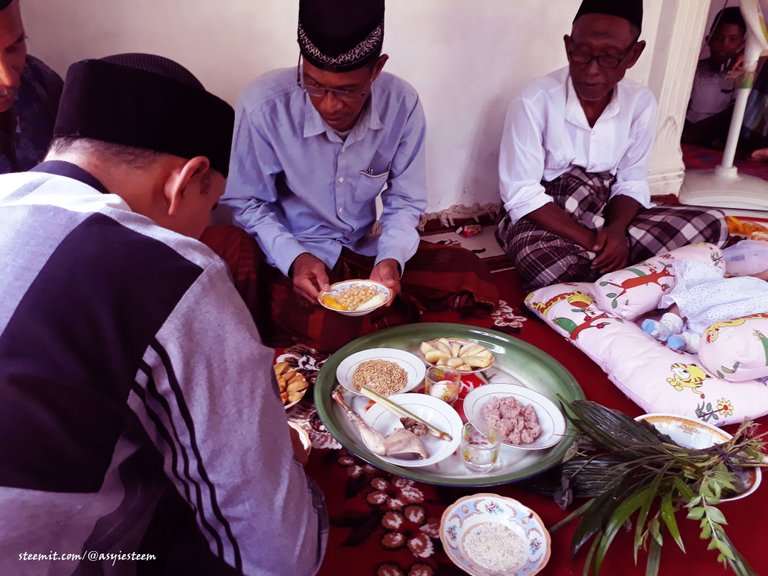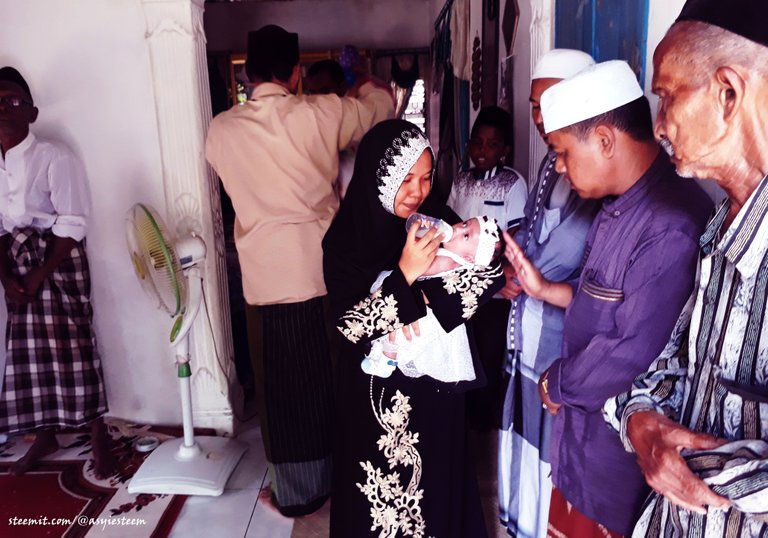Introduction
The people of Aceh have their own customs in treating newborn children. Peucicap custom one of them. Peucicap custom is usually done on the seventh day of the baby born, Peucicap event is done by smearing honey on baby's lips accompanied by prayer and hope with words so that the baby will grow up to be a pious child, devoted to both parents, religion, and nation.

Peucicap, Aceh Tradition for Baby
In the book The Achehnese by Dr. C. Snouck Hurgronje (1906) an Adviser for Native Affairs, Netlierlands India, on page 374 defines peuchichab (Peucicap): the ceremonial "giving to taste" (foodgiving to a baby).
Aceh is rich in various cultures. One of them is Peucicap , meaning taste various food flavors to the baby. Peucicap ceremony is focused on newborns. Simply put, this tradition is like introducing a new world to the baby. This cultural tradition was held on the seventh day after the baby was born. The baby is placed on a small mattress and an elder will taste the baby's lips to get to know the taste. Peucicap usually done by smearing a drop of honey or water zam-zam, and some even tasting yolk to the baby's mouth. Although the ritual of tasting this taste is only a mere symbolic, but has a deep meaning. When smearing on the baby's lips is done, there is hope that the baby grows into a devoted, pious, and useful child for others. So, when this smearing, always accompanied by prayers.

History of The Peucicap of Baby
Peucicap tradition that is passed down through generations for the people of Aceh, has high religious values and philosophy. Peucicap tradition is believed to have existed since the mid-13th century AD or the era of the Islamic Empire Sumatrah. This tradition grew three centuries later in the heyday of the Kingdom of Aceh Darussalam. The legacy of this sultan continues to be celebrated from generation to generation among the people of Aceh until now. Peucicap traditions will continue to be preserved as a legacy of Acehnese ancestors.
Sacred Ritual
Peucicap is a hereditary tradition in Aceh. A custom rituat full of religious meaning and philosophy. Peucicap ritual is a sacred tradition for the people of Aceh who do not pass through the generations. This ritual is performed when the child is old enough; even 44 days old, can also be 3, 5, or 7 months.
Peucicap procession is done solemnly and full of religious nuance. invite a pious to lead a sacred ceremony. At first the baby was peusijuek (cooling through the water spray) with a prayer reading for blessing. In the tray lies a variety of foods such as yellow rice, teumpoe (typical aceh food), fried chicken thighs, zam-zam water, chicken liver, dates and various sweet fruits. The cleric held the baby, his fingertips poking the menus in the tray, then touched to the baby's tongue for a more sensitive device. This procession is called peucicap. A moment later, the cleric turns the chicken's heart as a gesture for the child when the big one is smart, creative in thinking, his brain is not dead end.
H.M. Zainuddin in the book Tarich Atjeh And Nusantara (1961: 352) explains this passage in detail "After about 3 days the baby was born, then peucicap, peucicap means tasted food, the first food given is banana, the event was held with a bit of a kiss , ie a plate of sticky rice with a chicken slaughtered, chicken liver is placed into a plate and baked body placed on the sticky rice. Then the chicken in the dish is turned 7 times, then placed at the end of the tongue of the baby repeated put it up to 7 times with called: one, two, three, four, five six and seven. In the seventh word is called the length. The chicken liver was flipped back to 7 times meaning that if the baby has been big and at times gets hard in the war for example. Then he can quickly overturn his heart, think of escaping from the trouble and further to know this. "
One of them during peucicap procession is intended to hone the tongue of the baby to be more sensitive to various flavors.

The Meaning of Religion
Peucicap rituals are not merely ceremonial, but these traditions are believed to be important for the future of the baby because they have a social religious meaning in them. Every movement in this custom is considered important for the baby's growth and development.
People who are believed to lead peucicap are not just any. The family usually chooses a respected person or a respected figure in science or behavior, so that later the baby who can imitate it when big later.
The animal slaughtered the meat cooked, then eaten together. Some of these dishes are also distributed to underprivileged citizens, as a form of social concern as recommended by Islam.
Philosophy
This procession is intended as a medium to build a shared responsibility for the growth of the baby. For example the movement in peucicap ritual. It's not just to touch the taste that the baby's tongue is more sensitive. But the sweet flavors that are touched to the child's taste organs are also required followed by a sweet morality (good) as well. So that the morality of the child is also sweet later, like the fruits.

Concluding
The event is usually packed in the form of entertaining guests. In Aceh itself, entertaining is a prevalent thing to do. The goal is not merely to eat food, but also to build relationships. Ripe goat stew is served for the guests in attendance. Part of it is distributed to the less fortunate.
This tradition is also intended as a form of responsibility for the baby's growth and development. In addition, tasting the taste to the baby's lips rather than just forming the sensitivity of the tongue, but also means to create morals and good manners also.
This tradition is still grounded in Aceh. Although the movements and terms between one region and another region vary, but the principles and meanings remain the same.
Photos taken with Samsung Galaxy J7 Prime
Location: North Aceh
Thank you for taking part in this months #culturevulture competition. Good Luck
You are welcome
Great post. Can you mention about the sources, references you used to write this article?
You can see directly the book I mentioned in this article. title of the book I wrote in the post
good post kawan, i like it, keren,....
Thanks @munaa